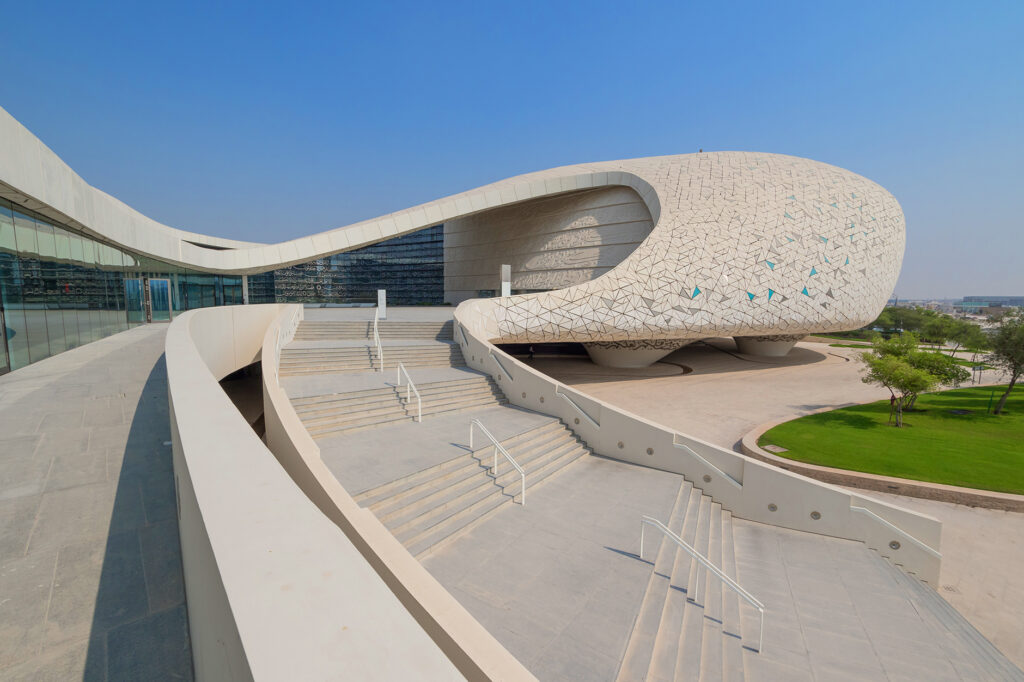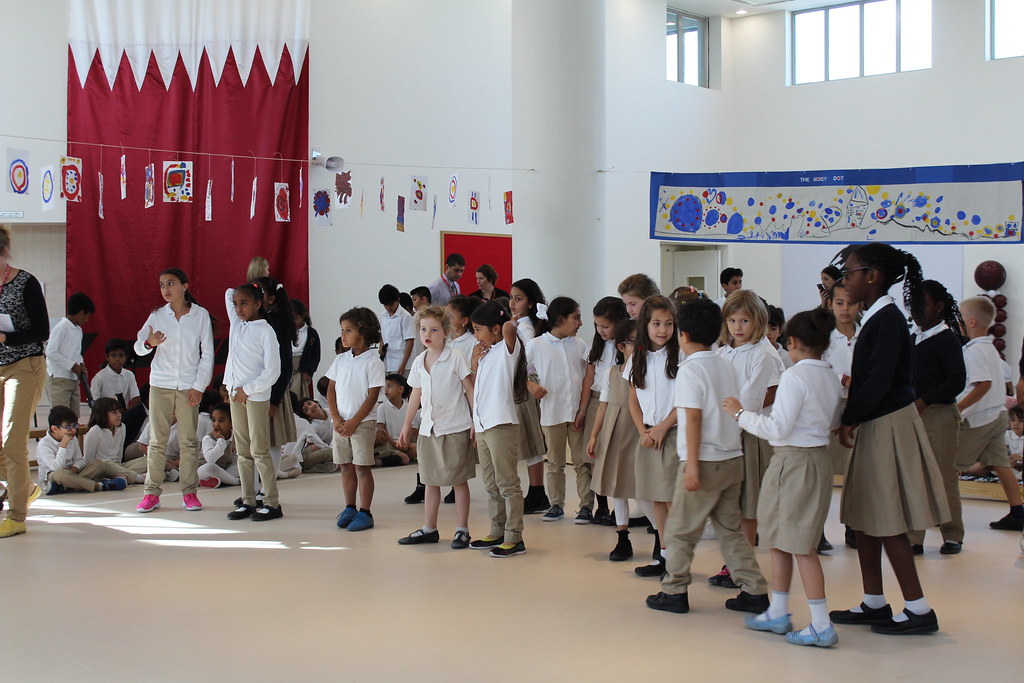Best international schools in Qatar – that will be the topic of today’s article.
Before introducing this article, if you are interested in our core services which are expat financial, insurance and mortgages, you can contact me here.
The best time to consider your financial situation is when you are moving to a new country.
Introduction
Qatar is a small state located in the northeastern part of the Arabian Peninsula. Characterized by a high standard of living, in the 2012 ranking, it ranked first in the world in average per capita income. The main source of income for Qatar is the export of oil and gas, the rest is the service sector. The overwhelming majority of the citizens of this state (as well as of other states in the region) profess Sunni Islam, which determines the way of life characteristic of most Muslim countries.

Knowing the approximate figures of the monthly income of the Qataris, many make a simple, but not entirely correct conclusion about life in this Arab state. The opinion of outside observers is: “Qatar is an ideal country, almost a paradise.” However, the first impression is far from complete. The nuances should be understood in more detail.
The standard of living in Qatar, his salary in 2021 allow literally every resident of the country to live comfortably. Prices in Qatar are in line with local salaries.
Doha is slated to host the 2022 FIFA World Cup. Many projects are being implemented to build 12 stadiums, increase the number of hotels and their size, and modernize the transport system. Only the road network is going to make a contribution of $ 20 billion!
There is also a plan to build a new city that will house 200,000 people.
However, the situation with migrants is different. An interesting fact is that the per capita income in Qatar is $ 88,000. But at the same time, the annual salaries of builders at the already mentioned stadiums do not exceed 2-3.5 thousand. This is for 6 working days a week, 15 hours a day!
The secret is that upon arrival in the country, workers renegotiate contracts, part with the promised monthly salary of $ 500, free housing, and food.
They subscribe to new conditions: salaries of up to $ 200 a month (due to the deduction of the amount for room and board).
Accordingly, the standard of living of immigrants differs significantly from that of a native resident. Therefore, do not rush to immigrate and obtain Qatari citizenship, take care of a good job and a high salary.
There are two ways to prevent the above-described surprises:
- Enlist the support of an experienced international lawyer.
- The most well versed in matters of jurisprudence, know the Arabic language.
The positive sides of life in Qatar

The obvious advantages of living in Qatar include the following:
- High level of remuneration. True, one clarification needs to be made here – the level of wages is high either for local residents or for narrowly demanded specialists. For an immigrant without special skills working in the service sector, the salary will be 400-600 US dollars, while a Qatari citizen in the same position will receive at least three times more.
- Safety. Qatar is one of the quietest countries in the region; terrorists are only talked about in foreign news. Crime is at a very low level, you can calmly walk at night not only in the center of the capital, but also on the outskirts of the city. And this despite the relatively small (compared to the total number of residents) the number of representatives of the security agencies.
- Sights. The state is rich in unique architectural structures. The capital of Qatar, Doha, is itself a masterpiece of building art. It surprisingly combines unsightly two-storey buildings and skyscrapers mesmerizing the spirit. You can get an unforgettable experience from visiting a local amusement park, a zoo, unique for the climate and desert area; an aesthetic pleasure will be given to a tour of the National Museum of Qatar. However, it is necessary to clarify that none of the above can be photographed, since this action is prohibited by law (in relation to attractions, as well as police and military facilities).
Negative sides of life in Qatar

Unfortunately, there are also plenty of downsides in this country. The main disadvantages of the country are:
- By the appearance of the terrain, the entire territory of Qatar is a desert. The weather is also not very diverse – dry and hot gives way to very hot and very dry. So a person who does not tolerate the heat will not stay in this country for health reasons;
- Life in the country is very expensive. If the employer does not provide housing and food to the immigrant, then coming to Qatar on a work visa will practically lose its meaning.
- Qatar, in contrast to the same UAE, is a rather radical Islamic state. Associated with this are a bunch of prohibitions for residents and immigrants. For example, if a visiting worker is caught in a “not very sober state”, deportation to their historical homeland will follow within a very short time. Stricter restrictions apply to the month of Ramadan, when the consumption of any food or smoking in public places is prohibited;
- Strict conditions of the working contract. If a person from the post-Soviet space wants to go to work and live in Qatar, then he must be ready to work for two. The fact is that local employers are “sponsors” of visitors, paying for the flight to the country and the execution of all the necessary documents. For Indians or Filipinos, it is common practice to renegotiate employment contracts with unenviable conditions (for example, with a salary of two hundred dollars instead of six hundred). You must also be prepared for such a turn of events. Until recently, it was not legally allowed to leave the country without the written consent of the employer. Also, the contractor is prohibited from looking for another job during the entire duration of the primary contract (in most cases, it is two years).
- Problems with obtaining citizenship. It is extremely difficult to obtain Qatari citizenship for an immigrant. If the issue of obtaining a long-term work visa or even a residence permit can be resolved, then serious difficulties will arise with full citizenship. Firstly, the applicant will be required to live in Qatar for at least 20 years (if the applicant is Arab, then 15 years). Secondly, the applicant must have legal sources of income and no complaints from law enforcement agencies. And thirdly, the immigrant must pass the Arabic language proficiency test.
Education in Qatar

The education system in Qatar is managed and supervised by the Supreme Council for Education (SEC) and (MOEHE). The SEC is responsible for overseeing independent schools, while the Ministry of Education is responsible for supporting private schools. Formal schooling officially began in 1956. Primary education is compulsory for every child and is free in public schools.
Education in Qatar is very diverse and several schools present different international curricula. There are about 150 international schools in the country. Several prestigious universities from around the world have subsidiary campuses in the country in Education City and in the suburbs of the capital Doha.
International educational institutions in Qatar
In Qatar, there is a large number of private and international schools. Most expats and some Qataris choose to send their children to these schools. These schools (and curricula) include Qatar Academy (IB World School), Doha College (UK Curriculum), Doha American School, Gulf English School (UK / IB curriculum), Doha Academy, Doha English Speaking School (UK Primary program), The International School of Choueifat, The Cambridge School, Dukhan School of English, Park House English School, Compass International School, Qatar International School (British Curriculum for England), MES Indian School and Ideal Indian School (CBSE). Modern English School, Philippine School Doha, Stafford Sri Lankan School Doha, Middle East International School, Sherborne Qatar (British Curriculum), and Mesaid International School.
Vision International School in Al Wakrah will offer the American PreK-12 classroom curriculum. It opened in September 2014.
According to January 2015, the International Schools Consultancy (ISC) has contributed 147 international schools to Qatar. ISC defines an “international school” as the following – “ISC includes an international school if the school offers a curriculum for any combination of preschoolers, elementary or high school students, in whole or in part in English outside of an English speaking country, or if the school is in the country, where English is one of the official languages, offers a curriculum in English that is different from the country’s national curriculum and is international in orientation.”
Let’s now review some of the best international schools in Qatar, to make it easy for you and your kids in choice. But first let’s see what kind of international schools and curriculums can Qatar offer you.
International school programs and certificates in Qatar

International Baccalaureate (IB)
Some consider the International Baccalaureate program to be an international educational standard. This is largely due to the fact that it is a structured academic, comprehensive program that focuses on creativity, critical thinking, and writing. In addition, their attentiveness to service projects is recognized worldwide for its rigor.
The curriculum includes mathematics, science, arts, literature, and language. Upon graduation from high school, students take a comprehensive exam to obtain a diploma. In Qatar, 17 schools offer IB.
International GCSE (IGCSE)
The UK Curriculum International Certificate of General Secondary Education is widely popular in international schools. Divided into three stages that culminate in A-level certification, students can use them in their university applications.
IGCSE is very convenient for parents of students who intend to study in the UK or the British Commonwealth. Students take courses in English and Literature, Foreign Language, Mathematics and Science.
After the first two years of high school, students take the IGCSE exam, usually through the Cambridge International Examination Board. Over the past two years, they have taken A-Level exams in several areas of study, and these results are key to university admission. For this reason, many expatriate parents find continuing education within the British system in Qatar and a British university very convenient.
American High School Diplomas and Advanced Placement The American educational model divides education into elementary, middle, and high school. However, it is generally much less structured than other programs.
Reputable students take the required exams and receive a diploma. They usually study social studies, mathematics, science, English, and a foreign language.
Some parents prefer American schools because they can offer Advanced Placement courses, which many American universities accept as college loans; as well as SAT preparation courses. For parents of students intending to study in the United States, this smoother transition is very attractive.
Compass International School Doha
Compass International School Doha is more than just a school. This is a thriving community where your child will become the best version of themselves and where your child will have no boundaries in what they achieve. Every child is encouraged to strive for learning and exceed expectations.
Each child is raised through individualized learning to develop self-confidence and develop into ambitious learners and strong performers. We understand the importance of developing social skills as well as academic excellence. Our students are encouraged to think independently and critically, to evaluate and make judgments for themselves and with their peers.
With 66 schools in 29 countries, Nord Anglia Education (NAE) has unique partnerships and connections with world-renowned institutions such as the Juilliard School, Massachusetts Institute of Technology (MIT), and UNICEF, which offer students a rich and innovative learning experience. help your child understand their future.
The Global Campus offers challenges, collaborations, and worldwide experiences that will bring many benefits to your child and stimulate their natural curiosity about learning.
Children ages 3-18 study at their four campuses in Doha: Themaid, Madinat Khalifa, Gharaffa, and Rayyan. Study programs offered on our campuses include the International Initial Curriculum, English National Curriculum, IGCSE, International Baccalaureate (IB) Diploma Program, and A-level.
Doha British School
DBS is a vibrant, welcoming international school providing a first-class education that will enable all of their students to thrive in an increasingly dynamic global environment.
Their main goal is to ensure that every student gets the most out of DBS. This is based on their fundamental belief that all learners can, need, and want to achieve. The school aims to improve the educational level and life chances of students regardless of race, ethnicity, gender, religion, ability, or disability. They fulfill their vision by creating an educational, fun, and social environment that supports modern teaching and learning practices.
The school strives to provide an inspiring, student-centered, and stimulating academic experience. The teachers are recruited for their knowledge, enthusiasm, enthusiasm, and their ability to communicate with students to ensure that each one is engaged, challenged, stretched out, and encouraged in the learning process.
They also strive to ensure that all of the students become considerate, selfless, and open-minded young people; that they are inquisitive and learn to ask questions, think critically, and work independently; that they respect the views and beliefs of others; that they are considerate and supportive of each other; that they are aware, reflective and willing to take risks.
These characteristics combine to create the student profile that exists in and out of Doha British School. Their standards and expectations are high. The teachers and support staff are great, and kids and young people are wonderful. They say if you want to understand DBS and the unique environment, you need to experience it.
Vision International School
Vision International School is a school developed by the International Schools Service (ISS) located in Al Wakrah, a close suburb of Doha, Qatar. The school opened in September 2014 and since then they have focused their efforts on creating a high-quality educational institution for a select group of parents who demand better education, environment, and school community for their sons and daughters.
They also boast a mix of highly trained and experienced staff, abundant resources and educational teaching tools, and a spacious and secure campus that includes a purpose-built building fully adapted to accommodate all students from early childhood through high school. The students represent over twenty nationalities from all over the world.
The school follows the American international curriculum: the educational standards are brought from the United States, as are many of the teachers and most of the teaching resources. The school’s curriculum is tailored to the culturally diverse needs of the students while demonstrating a strong commitment to lifelong learning and service.
They are passionate about what international education means to prepare future leaders for these difficult times. At VIS, they strive to create a community of caring, curious, critical thinking people who, in turn, will take advantage of what they learn and improve the world around them – wherever it is.
So Vision International School is a private school which is owned by the renowned Almuftah Group. The school is located in a modern, spacious and beautiful educational institution located in Al-Wakrah – a close suburb of Doha.
Classes 1 and above are unisexual. The school offers an American international curriculum alongside the Arabic language, Qatari history, and Islamic studies. The purpose-built campus including:
- An early childhood section for Pre-K and Kindergarten Elementary school for Grades 1-5;
- sections for boys and sections for girls Middle/High school for Grades 6-11;
- sections for boys and sections for girls;
- A full-size gymnasium, swimming pool, two cafeterias, well-equipped libraries, art, science, and music labs, and exciting play spaces in both shaded and air-conditioned settings
- A robust After School Activities program for all grades from KG1 and up
Teaching and Application at an International School in Qatar
In order to apply to an international school in Doha, the present time may be asked:
- Latest school report
- A copy of the report nursery (for young children)
- Copy of the passport
- Copy of Qatar Residence permit
- Passport photos
- vaccinations (for young children)
- Registration fee
Students may also be required to take cognitive ability tests (online) and/or take part in assessments (online or in-person). The ideal time to apply in schools is in January, if how would your child do in September. However, the waiting list for some schools can be up to 24 months. Tuition fees can vary depending on the school.
Is it worth sending your child to an international school in Qatar?

Qatar has one major city, Doha, where the majority of expats live. This reality, combined with the inaccessibility of public schools, means that an international school is one of the only viable options for expatriate children.
International schools are attractive because the students are different, from various countries and the staff is used to work with expats. In addition, it should be easier for your child to transition to your country’s education system. However, keep in mind that while some Qataris attend international schools, sending your child to one of them essentially means depriving them of a key institution for potential integration into Qatar.
Choosing the right international school for your child will depend on several factors. What language will your child learn? What curriculum makes sense for your family and your child’s future curriculum?
In addition, take time for the whole family to consider your child’s learning needs and, moreover, their extracurricular interests. When visiting different schools, raise them in conversation. However, keep the long waiting lists in mind when deciding where and when to apply. If you can, it might be a good idea to sit in the classroom to get an idea of the dynamics of the class and the philosophy of teaching.


